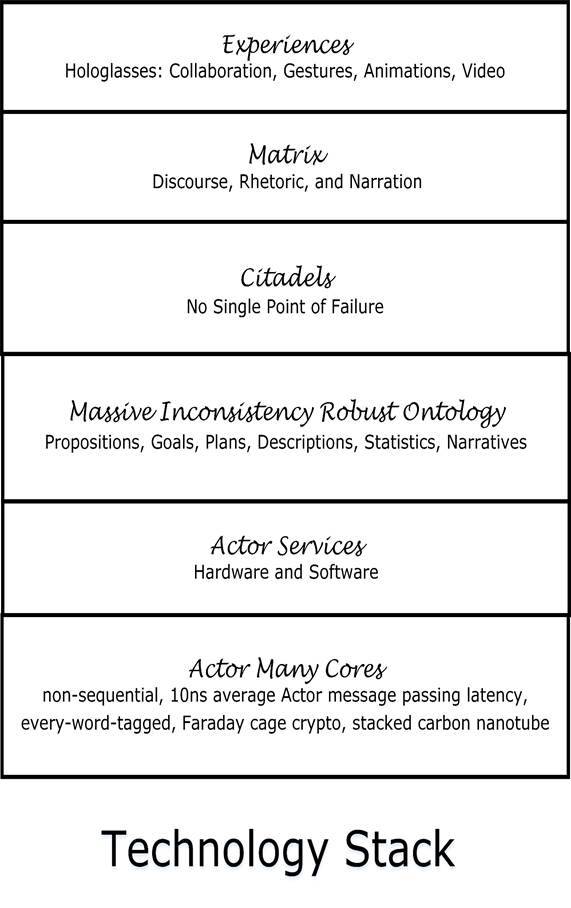Communications of the ACM
Scalable Intelligent Systems by 2025

Scalable Intelligent Systems can be brought to fruition by 2025 with the following characteristics:
- Interactively acquire and present information from video, web pages, hologlasses, online data bases, sensors, articles, human speech and gestures, etc.
- Real-time integration of massive, pervasively inconsistent information
- Close human collaboration using hologlasses for secure mobile interaction.
- Organizations of people and IoT devices (Citadels) for trustworthiness, resilience, and performance with no single point of failure
- Scalability in all important dimensions including no hard barriers to continual improvement in the above areas.
There is no computer-only solution that can implement the above, i.e., people are fundamental to a Scalable Intelligent System.
Scalable Intelligent Systems are the most complex software that has ever been created by a long shot. Numerous enormous government programs are under way. [Canada 2017, China 2017, European Union 2018, France 2018, Germany 2018, Japan 2017, Nordic-Baltic Region 2018, Taiwan 2018, United Kingdom 2018, United States 201]. The development of Scalable Intelligent Systems will create enormous social and policy challenges. [Hewitt 2018]
Scalable Intelligent Systems can be of enormous value in Pain Management
According to Eric Rodgers, PhD., director of the VA's Office of Evidence Based Practice, "The use of opioids has changed tremendously since the 1990s, when we first started formulating a plan for guidelines. The concept then was that opioid therapy was an underused strategy for helping our patients and we were trying to get our providers to use this type of therapy more. But as time went on, we became more aware of the harms of opioid therapy and the development of pill mills. The problems got worse.
"It's now become routine for providers to check the state databases to see if there's multi-sourcing — getting prescriptions from other providers. Providers are also now supposed to use urine drug screenings and, if there are unusual results, to do a confirmation. [For every death from an opioid overdose] there are 10 people who have a problem with opioid use disorder or addiction. And for every addicted person, we have another 10 who are misusing their medication."

Pain management requires much more than just prescribing opioids and other pain killers, which are often critical for short-term and less often longer-term use. [Coker 2015; Friedberg 2012; Holt 2017; Marchant 2017; McKinney 2015; Spiegel 2018; Tedesco, et. al. 2017; White 2017] Organizational aspects play an important role in pain management. [Fagerhaugh and Strauss 1977]
Scalable Intelligent Systems can help users with appliances, entertainment, exercise, hypnosis, medication, meditation, physical therapy, and collaboration with medical helpers.
Technology Stack
Technology stack for Scalable Intelligent Systems is diagrammed below:

References
Canada. Pan-Canadian Artificial Intelligence Strategy, March 2017.
China State Council. Next Generation Artificial Intelligence Development Plan, September 15, 2017.
European Union. Communication on Artificial Intelligence, April 2018.
France. Artificial Intelligence for Humanity, March 29, 2018.
Germany. Strategy Paper on Artificial Intelligence, July 18, 2018.
Carl Hewitt. Scalable Intelligent Systems by 2025, 2018 Saint Andrews Distinguished Lecture Series.
https://blogs.cs.st-andrews.ac.uk/csblog/category/series/distinguished-lectures-series/
Carl Hewitt. Citadels Protect Sensitive Citizen Information: Verifiably Ending Use of Sensitive IoT Information for Mass Surveillance Can Foster (International) Commerce and Law Enforcement SSRN.
https://papers.ssrn.com/sol3/papers.cfm?abstract_id=2836282
Japan. Artificial Intelligence Technology Strategy, March 31, 2017.
Nordic-Baltic Region. Declaration on Artificial Intelligence in the Nordic-Baltic Region, May 2018.
Taiwan. "Taiwan Artificial Intelligence Action Plan," January 2018.
United Kingdom. Artificial Intelligence Sector Deal, April 26, 2018.
United States Department of Defense. Establishment of the Joint Artificial Intelligence Center, June 27, 2018.
Carl Hewitt is an emeritus professor of the Massachusetts Institute of Technology. He is board chair of iRobust, an international scientific society for the promotion of the field of Inconsistency Robustness, and board chair of Standard IoT, an international standards organization for the Internet of Things, which is using the Actor Model to unify and generalize emerging standards for IoT.
No entries found